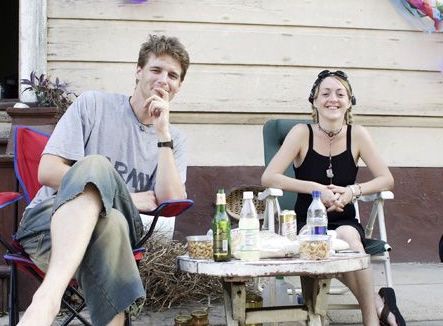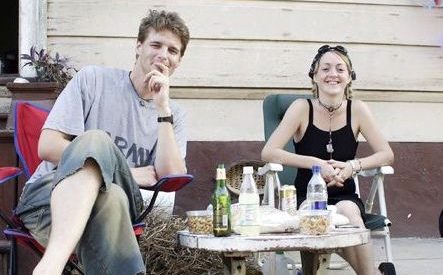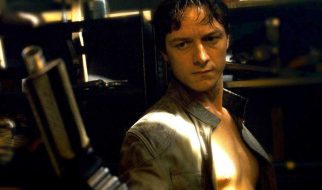 Zack Bowen and Addie Hall. Photographer unknown.
Zack Bowen and Addie Hall. Photographer unknown.
On Oct. 17, 2006, around 8:30 pm, New Orleans police received a disturbing call from the Omni Royal Orleans Hotel. A man?s body was on the roof of the parking garage.
Upon arriving and seeing the severely mangled body, it was clear the man had died on impact. Unsure if they had a murder, suicide, or tragic accident on their hands, the investigators began by searching the body for ID. In the man?s back pocket, they found a note reading (in part):
?This is not accidental. I had to take my own life to pay for the one I took.
If you send a patrol to 826 N. Rampart you will find the dismembered corpse of my girlfriend Addie in the oven, on the stove, and in the fridge along with full documentation on the both of us and a full signed confession from myself?
Zack Bowen.?
Police rushed to address, a small apartment above the Voodoo Spiritual Temple. Once inside, they were confronted by something out of a horror movie.
Despite the warm October weather, the apartment was cold, the air conditioning set on 60. The walls were spray-painted with haunting messages of regret and pain, such as ?I?m a failure,? and instructions to call Zack?s ex-wife and tell her he loved her.
One message on the wall directed them to the stove. There, in a pot on one of the burners, was a human head, burned beyond recognition. In another pot were hands and feet. Inside the oven, in a large roasting pan, were arms and legs, also burnt. Investigators noticed that there appeared to be seasoning on the limbs. And on the counter next to the stove were cut-up potatoes and carrots.
Inside the refrigerator, in a large plastic bag, they found the torso. But as horrifying as these discoveries were, police would soon find even more disturbing evidence in Addie Hall?s journal.
The couple?s friends were shocked when they heard the news. Though they said the couple had been unhappy for a while ? they ?constantly argued? ? no one could have predicted such a gruesome ending for either of them.
Bowen and Hall had met when they were both bartenders in the French Quarter. Bowen, tall and good-looking, was known as somewhat of a charmer, and Hall was a free-spirited artistic type who wrote poetry and taught dance classes.
They fell in love during Hurricane Katrina, when Hall let Bowen stay with her to ride out the storm. Strangely, the two seemed in their element during the weeks after the hurricane: without electricity, trading drinks for food, and no jobs or bills to worry about, it was more like an extended camping trip than a disaster. Hall became known for flashing her breasts at police, and the two bartenders would serve drinks to passersby. Their tale of love and colorful survivalism attracted many in the media, and the couple were even featured in the New York Times.
But the party had to end sometime, and friends said the return to ?real life? put a lot of strain on two people who both had issues.
Hall, according to her friends, had been molested when she was young, and, like many abuse victims, went on to have a string of abusive relationships as an adult. Some said she was bipolar, and it?s likely she suffered from PTSD from being molested. She was known to be a heavy drinker, and some said she could be ?a mean drunk.?
Bowen, as well, had his issues. He had served as a military police officer in Kosovo and Iraq ? including time at Abu Ghraib. One experience in particular that friends said ?messed him up? the most was when a girl he had befriended in Iraq was killed ? along with her whole family ? when her family?s shop was bombed. Like so many who served in those wars, he returned home depressed and suffering from PTSD.
Despite earning a NATO medal and the Presidential Unit Citation for his service, plus his commanding officer?s recommendation that he receive an honorable discharge, he was released with only a general discharge. That meant that while he qualified for VA benefits, he couldn?t get GI Bill education benefits. This left Bowen very bitter.
At some point, the two troubled, heavy drinkers also started doing cocaine on the regular. Their relationship deteriorated to the point that they were ?arguing constantly? and Bowen?s friends said that he often complained about Hall.
Then, on Oct. 4, the day before her murder, Hall went to their landlord to have Bowen taken off the lease. He had cheated on her, she said, so she was kicking him out.
The landlord didn?t comply, but instead told her to go home and work it out with her boyfriend. That was the last time anyone saw her alive.
In the eight-page confession letter Bowen wrote in Hall?s journal, he described in graphic detail what happened next.
?I killed her at 1 a.m. Thursday 5 October,? he wrote. ?I very calmly strangled her. It was very quick.?
After killing her, he sexually violated her corpse several times before passing out next to it. The next morning, he got up and went to work. When he returned, he moved Hall?s corpse to the bathtub, where he dismembered it using a hacksaw and a knife. Afterwards, he meticulously cleaned the bathroom.
It took him four days to decide what to do with Hall?s remains. During that time, he went on about his life as normal ? friends who met with him during the two weeks between the murder and his suicide said he seemed to be in good spirits, and even spoke of going on a vacation. In fact, his confession letter stated that he wanted to enjoy his last days on earth to the fullest, indulging in ?good food, good drugs, good strippers.?
Apparently he decided to cook Hall?s remains only in order to make them easier to dispose of. Despite the crime scene (and the rumors it spawned), the autopsy confirmed there were no human remains in his system.
It also revealed his body was covered in cigarette burns ? in his confession letter, he wrote that he burned himself once for each year he had been a failure.
In his confession, he expressed a great deal of regret: ?I scared myself not only by the action of calmly strangling the woman I?ve loved for one and a half years, but by my entire lack of remorse. I?ve known forever how horrible a person I am (ask anyone).?
The security cameras at the Omni Royal Orleans captured Bowen approaching the terrace and looking over it several times. Finally, he downed a final drink, then threw himself to his death.
And yet, this sad, grisly tale doesn?t end here. The later exploitation of this tragic event angered residents in a town that is notoriously forthright about its history of gruesome crimes. In fact, the Bowen/Hall case is pretty much the best example of the problems inherent in the true-crime genre.
Less than a decade after the murder, a woman named Mary ?Voodoo Queen? Millan leased the building on Rampart Street and set up shop as ?Bloody Mary Haunted Museum and Tour.? For a fee, visitors are let into the Bowen/Hall apartment to view the very stove and fridge where Hall?s remains were found. Reports are that the apartment was decorated like a schlocky horror film, complete with fake-blood splashes and a bride-and-groom set of Chucky dolls. One friend of the couple called it ?despicable and atrociously exploitative.? And I agree ? the event was horrible enough. Decorating it like some cheap slasher flick turns it into entertainment, erasing the reality of the actual people who lived and died in that apartment.
Millan defends her tours, saying it educates people about the crime. ?It?d be stupid to pretend (the couple) weren?t here,? she said. ?(Detractors) are jealous they didn?t do this first.? However, perhaps bowing to local pressure, her website doesn?t directly mention the Bowen/Hall crime scene ? though Yelp reviews confirm it is still on the itinerary, and that people are very excited to see it.
Then in 2017, the TLC series Paranormal Lockdown did an episode in the apartment (which, notably, was no longer decorated like a low-budget horror film). The ?investigators? reported sensing a cold draft despite the windows being closed, and a ?presence? in the bathroom. I suppose your view of this would depend on your beliefs about spirits ? or Paranormal Lockdown.
The fact is, people have always been both afraid of and fascinated by death. Since people have been having accidents, whenever there is one, people slow down and gather around, hoping to catch a glimpse of death or dismemberment. For centuries, executions ? including torture and beheadings ? have been grand public affairs. Even after we in the US moved the gallows inside away from prying eyes, whenever there?s a particularly reviled criminal being executed, crowds will often gather outside in a macabre carnival-like celebration, complete with signs, songs, and even merchandise.
If we can?t witness death first-hand, we still want to learn about it. Some of the first mass-produced newspapers were dedicated to the graphic retelling of murders, accompanied by detailed illustrations. Hotels that have had murders or other tragic events happen in their rooms are quick to capitalize on the fact ? because people are willing to pay money to stay in a room that might be haunted.
Nowadays, true crime is an entire industry ? from local tour operators to writers to TV and movie production companies ? all dependent upon murder. I learned about this case from New Orleans True Crime Experience, a walking tour I booked through AirBnB. It, along with dozens of other true-crime themed tours, are quite popular. Not only was our tour group at maximum capacity, oftentimes we had to share the sidewalk with other true-crime and haunted history tours. Was that exploitative? Our guide spoke of both criminals and victims very respectfully, didn?t overplay the gory aspects, and instead chose to focus on the tragedy. Yet I, and at least 11 other people, paid good money to hear all about it. And now, here I am publishing a story about the crime, and hoping to earn money from it myself.
Are we all awful people, profiting off the absolute worst human behavior? While some may turn up their noses as such ?morbid? fascination, they will eagerly take their children to the site of a large mass murder, while costumed actors reenact the tragedy ? all in the name of ?education.?
People (mostly women) have many reasons why they love true crime ? anna dorn has written an excellent analysis of our true-crime obsession. But we also recognize the ways it can be exploitative, so some creators and consumers of true crime, like Kyrie Gray and J. Reuben Appelman, have taken a close look at themselves and decided to work to make sure the genre is more respectful of the victims.
Like them, I believe there is a middle path that both respects the victims but doesn?t gloss over the reality of the crime. We can?t change human nature, but we can change the way we talk about death.
Note: this article contains affiliate links.


